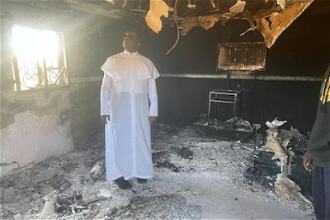Dodoma diary 7&8 - Dave Stewart SJ
Dave Stewart SJ continues the account of his visit to schools and development projects in Tanzania. We made it to St Ignatius primary school in time to see the kids at morning Assembly; both Fr Gaspar and I were formally welcomed by Sr Euphrasia, the Head, and expected to give a small speech. The sun had been up for less than an hour yet the children stood in the open, in lines, mostly wearing sweaters above their standard uniforms. Some grinned at us, others were more reserved, some sang as they were told, most yawned; in other words, like early-morning school kids anywhere. The programme included the school song, another song I didn't quite follow with movements I didn't follow but which resembled "I Got Rhythm" and the national anthem, that beautiful hymn melody that is shared by several southern Africa states. The school has just under 200 children at the moment, rising to over 400 eventually as the classroom blocks are completed and the early years grow older. Already there are 4 forms, the youngest of which is just beginning. When they started this school, the Jesuits in Dodoma decided not to introduce all ages at once but to let the school grow gradually. In time, a secondary school may well grow out of this primary. Before that can happen, there has to be a great deal more fundraising done. There is good ground nearby, with water, available now, which the local Jesuits think they may be able to acquire reasonably. While they fully appreciate that I am not here as any kind of western NGO donor, we agree that I will talk to people back home about ways of being partners to this exciting and much-needed new Jesuit school. What kind of help would they like? We'll need to be aware that the more traditional donor/recipient relationship is not so appropriate any more and that the desire is more for friendship in Christ rather than subservience. That said, the school has been built only by the generosity of overseas friends and now the need is for equipment; particularly schoolbooks and educational materials. Used and discarded textbooks in any subject can be transported to this school but how much better it would be if these could be obtained in-country; thus, not least, helping the local economy and reducing freight costs, meaning that more value can be directed towards the intended recipients. Dodoma to Mwanza It was decided not to drive to Mwanza. At first we'd planned such a journey but it would have taken too long from Dodoma in the centre of the country to Mwanza up in the north. The road is unpaved, rutted gravel all the way. This is the vast, treeless region of the spectacular annual wildebeeste migration, when up to 2m animals, with hundreds of thousands of gazelle, zebra, followed by their predators, thunder across the Serengeti Plain and the Masai Mara looking for pasture and rains. The train from Dar es Salaam to Mwanza takes three days. It would have taken us at least two days, maybe more, and tied up one of our men and one of the mission's trucks. So the decision as taken to fly from Dar The flight is on an elderly, strictly functional turboprop. There is little in common with what we have come to expect in Europe, even on low-cost-carriers; seats are fixed and hard, cargo is carried wherever it will fit in and, although the aircraft feels strong and sturdy, there's no cosmetic attempt to hide the signs of use and wear. My latent racism surfaces when I, embarrassing myself, detect my own relief on seeing a European pilot, a Dutchman as it turns out, enter the flight deck. It's a bumpy flight in this heat as the thermals pitch and toss the aircraft immediately after rotation and through the climb. It's worth it for the view. The vastness of the plain, and of Africa, seems infinite. Away from the pollution haze of Dar, crossing the Rift Valley, mountains emerge through the heat and then give way to bare desert, the colour of day-old champagne. Descent was announced into Shinyanga, 140 km south of Mwanza, a surprise to this passenger at least, who'd been told that this was a direct flight. And so for the first time in my life, I landed on a brown gravel airstrip. It's not as scary as it threatens to be. The air terminal for this small township is rather grand; it seems to be wearing clothes several sizes too big. Nobody got off but many got on; two occupied the seats usually reserved for the cabin crew, who sat on the floor for takeoff. Gold mining is developing in this region and a supporting infrastructure is beginning to take shape. Most of the passengers who boarded conversed in guttural Afrikaans. Fr Haschka SJ, originally from Milwaukee, met me at Mwanza and drove to the Jesuit community and fine church of St Francis Xavier, in the centre of this pleasant cool town. Mwanza lies between the desert of the Serengeti and the continent's largest lake. Cool winds off Lake Victoria mean a fresh and pleasant climate. The church and the community/parish buildings have been cleverly designed to take advantage of these breezes; a natural air conditioning. Across the street from the Jesuit compound is the lake itself but swimming would not be wise; there's bilharzia in these waters.


















